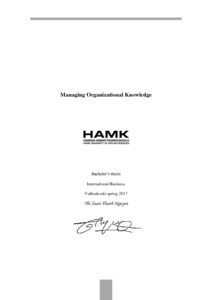Managing Organizational Knowledge
Nguyen , Thi Xuan Thanh (2017)
Nguyen , Thi Xuan Thanh
Hämeen ammattikorkeakoulu
2017
All rights reserved
Julkaisun pysyvä osoite on
https://urn.fi/URN:NBN:fi:amk-201705015854
https://urn.fi/URN:NBN:fi:amk-201705015854
Tiivistelmä
Knowledge has long been such a self-evident factor in many organizations that no one was talking about it. But as today’s dynamic business environment is being shaped by such a global competitive landscape, knowledge has become a key competitive factor, which cannot be ignored. The main purpose of this bachelor thesis is to clarify and highlight today’s required knowledge management as well as the key factors that ensure continuous knowledge creation.
The objectives of this bachelor thesis are: (1) to get familiar with the theory of knowledge management approaches and the continuous knowledge creation process in consideration of tacit knowledge capturing and codification. (2) To describe the current practical implication of knowledge management in Swiss and Finnish case companies, namely Nestlé S.A., KONE Corporation and Rovio Entertainment Ltd. based on quantitative and qualitative secondary data analyses. (3) To analyze the results by a direct theory-and-practice comparison as well as similarities and differences between the three case companies through external benchmarking. (4) To highlight the key factors or best practices and to provide recommendations to the case companies for future actions. The method used to gather information predominantly contains secondary data analysis, including selective reviews of literatures, internet research, professional blogs and published articles.
The main outcome shows the existence and importance of knowledge creation implication within the case companies in order to produce innovation. The central aspect in managing organizational knowledge is to understand how tacit knowledge can be captured and codified for future use, especially when it comes to the retirement of key knowledge workers. The interaction of tacit and explicit knowledge as well as tacit knowledge mobilization are one of the key factors to ensure a continuous knowledge creation. To enable an optimal condition for knowledge creation within the case companies, the author recommends the development of rewards and recognition for knowledge sharing as well as the creation of an organizational culture in which trust between employees and open communication can take place.
The objectives of this bachelor thesis are: (1) to get familiar with the theory of knowledge management approaches and the continuous knowledge creation process in consideration of tacit knowledge capturing and codification. (2) To describe the current practical implication of knowledge management in Swiss and Finnish case companies, namely Nestlé S.A., KONE Corporation and Rovio Entertainment Ltd. based on quantitative and qualitative secondary data analyses. (3) To analyze the results by a direct theory-and-practice comparison as well as similarities and differences between the three case companies through external benchmarking. (4) To highlight the key factors or best practices and to provide recommendations to the case companies for future actions. The method used to gather information predominantly contains secondary data analysis, including selective reviews of literatures, internet research, professional blogs and published articles.
The main outcome shows the existence and importance of knowledge creation implication within the case companies in order to produce innovation. The central aspect in managing organizational knowledge is to understand how tacit knowledge can be captured and codified for future use, especially when it comes to the retirement of key knowledge workers. The interaction of tacit and explicit knowledge as well as tacit knowledge mobilization are one of the key factors to ensure a continuous knowledge creation. To enable an optimal condition for knowledge creation within the case companies, the author recommends the development of rewards and recognition for knowledge sharing as well as the creation of an organizational culture in which trust between employees and open communication can take place.
